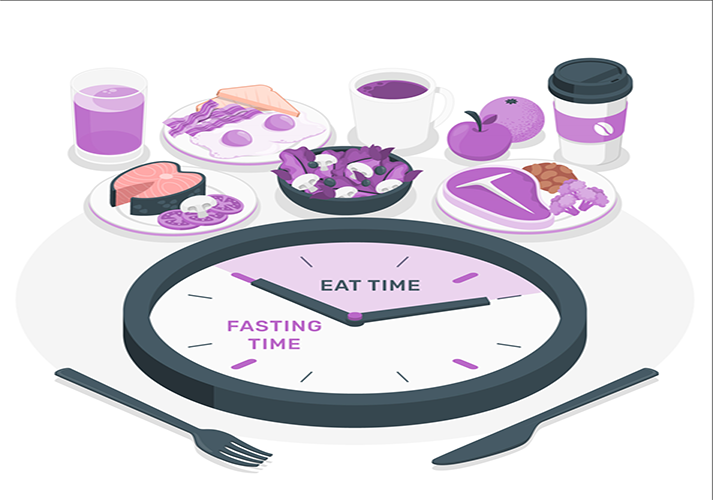What is actually intermittent fasting?
Intermittent fasting is a dietary approach that involves cycling between periods of eating and fasting. There are various methods, but common ones include the 16/8 (fasting for 16 hours, eating during a 8 hour window) or alternate day fasting. It’s popular for potential health benefit like weight loss, improve metabolic health and enhanced brain function, though individual results may vary
Intermittent fasting has surged in popularity as a health and fitness trend, backed by research suggesting it aids weight loss, boosts metabolic health, reduces stress, guards against diseases, and may extend lifespan. This article delves into what intermittent fasting entails and why it merits attention.

How does intermittent fasting benefits you?
Fasting triggers various bodily processes geared towards survival during times of scarcity. These changes involve hormonal, genetic, and cellular repair mechanisms. Fasting can lower blood sugar and insulin levels while boosting human growth hormone production, promoting muscle growth, strength, and lean body mass. Additionally, fasting offers other health advantages.
How to start intermittent fasting?
To start intermittent fasting, the first step is determining when you can comfortably go without food. Let’s say you decide to start today, but tomorrow at work, you feel dizzy. This can happen naturally.
That’s why I always recommend that when you start intermittent fasting, you choose your eating and fasting windows based on your own schedule. No one else lives your life.
Firstly, there are different types of intermittent fasting: 14:10, 15:9, 16:8, 18:6, 20:4, 24:24, 24:12, 30:12, 32:16, 36:24, 48:24.


Image by drobotdean on Freepik
First Step
First issue-Hydration : Don’t suffer from dehydration. so between the meals, drink plenty of water.
Second Step
The second issue is mineralization. Specifically, it’s crucial to maintain sodium, potassium, and magnesium levels, as well as carbonate-phosphate balance. A deficiency in these minerals can lead to a drop in blood pressure and irregular heartbeats. So, ensure you’re getting enough minerals while fasting, sometimes even more than usual.
Third Step
Thirdly, consider macronutrients. Consult a nutritionist to determine if you need to be in a calorie deficit. In many cases, it’s not necessary to restrict calories.
Forth Step
Fourthly, meal distribution matters. Don’t try to break your fast by skipping suhoor. You still need to eat a substantial meal at night or in the morning to function properly. Also, be cautious about indulging in too many sweets right after breaking your fast.
Last Step
Lastly, consider your fat intake. The results of your can depend on the types of fats you consume. As a general guideline, aim for 50% saturated, 20% monounsaturated, and 30% polyunsaturated fats, but this may vary for each person.
\Considering these factors will help you tailor intermittent fasting to work for you.
Precaution
Patients taking insulin or those with blood pressure or heart issues should not attempt intermittent fasting without medical supervision.
Intermittent fasting, if done correctly, can truly transform your life.
“Stay connected with us by following our website LifesPotion. Explore more and stay updated with the latest posts.”
